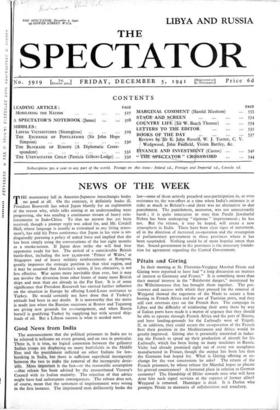Good News from India
The announcement that the political prisoners in India are to be released is welcome on every ground, and on two in particular. There is, it is true, 'no logical connexion between the gallantry Indian troops are displaying on many battlefields in the Middle East and the punishment inflicted on other Indians for law- breaking in India, bin there is sufficient superficial incongruity between the two to make the removal of the incongruity desir- able. More important is the fact—or the reasonable assumption —that release has been advised by the reconstituted Viceroy's Council with its Indian majority. The rejection of that advice might have had unfortunate consequences. The release does not, of course, mean that the sentences of imprisonment were wrong in the first instance. The imprisoned men deliberately broke the
law—some of them actively preached non-participation in, or even resistance to, the war-effort at a time when India's existence is at stake as much as Britain's—and there was no alternative to due punishment. The punishment, moreover, was not unnecessarily harsh ; it is quite inaccurate to state that Pandit Jawaharlal Nehru has been undergoing " rigorous " imprisonment ; he has not. But the release, it may be hoped, will create a new atmosphere in India. There have been clear signs of movement, all in the direction of increased co-operation and the resumption of parliamentary government in those provinces where it has been suspended. Nothing could be of more hopeful omen than that. Sound government in the provinces is the necessary founda- tion for agreement regarding the Central Government.






















